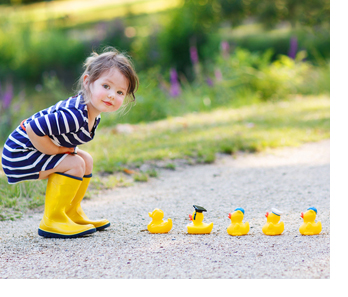
Nearly Half of Preschool Children Not Taken outside to Play by Parents on a Daily Basis: Study
Girls less likely to play outside compared with boys
SEATTLE; April 2, 2012—The American Academy of Pediatrics recommends that pediatric healthcare providers promote active healthy living by encouraging children to play outside as much as possible. Being outdoors correlates strongly with physical activity for children, which is important for preventing obesity in the preschool years and on through adulthood. A new study led by Pooja Tandon, MD, MPH, of Seattle Children's Research Institute found that nearly half of preschoolers in a sample representing four million U.S. children did not have even one parent-supervised outdoor play opportunity per day. The study, "The frequency of parent-supervised outdoor play of U.S. preschool age children," was published in the Archives of Pediatric & Adolescent Medicine (JAMA Pediatrics).
"Preschool age children should get at least 60 minutes of moderate to vigorous physical activity a day," said Dr. Tandon. "But many preschoolers are not meeting that recommendation. Young children need more opportunities to play outdoors and to help them be more active."
Preschool age children as defined by the study are those a year away from kindergarten entry, usually four or five years old. Parents or guardians have the greatest influence on children's behavior because kids spend the majority of time in their care. This is true even for children in child care, as preschoolers in the U.S. spend an average of 32 hours per week in child care.
Contrary to popular belief, researchers did not find evidence that excessive screen time on computers or watching television was related to less outdoor time.
Moms take kids outside more often
Girls are less likely to play outside compared with boys, according to the study. And mothers took their children outside to play more often than fathers. Forty-four percent of moms said they took their kids outside daily, compared to 24 percent of dads. Fifteen percent of mothers and 30 percent of fathers did not take their child outside to walk or play even a few times per week.
"Physical activity through play is essential for preschoolers' growth and development," said Dr. Tandon, who is also acting assistant professor of pediatrics at the University of Washington. "Outdoor play is also beneficial for motor development, vision, cognition, Vitamin D levels and mental health," she added.
Racial, ethnic disparities exist
The study also found that children with non-white parents are less likely to go outside with them for play. Asian mothers were 49 percent less likely, black mothers 41 percent less likely and Hispanic mothers 20 percent less likely to take their child outside, compared with white mothers.
"Racial and ethnic disparities in rates of children who are overweight or obese start early on in life," said Dr. Tandon. "Children in a low socioeconomic status may have fewer opportunities to be active and play outside."
Playmates, parents who exercise
Preschoolers with three or more regular playmates were twice as likely to go outside daily. Mothers who exercised more than four times per week were 50 percent more likely to take their child outside daily than mothers who did not report any exercise.
The study findings highlight considerable room for improvement in parent-supervised outdoor play opportunities for preschool age children. "Even if parents are not able to take their children outside to play due to logistics or time constraints, they can advocate for or insist upon it in child care or preschool settings," said Dr. Tandon. "If we can increase awareness of why it's so important for children to be outdoors, there can be a cultural shift and our children will benefit in many ways."
Dr. Tandon Offers Tips for Parents to Increase Outdoor Physical Activity for Kids
- If your child is in day care or cared for by others, ask about outdoor play time
- Increase awareness among friends of why it's important for children to play outdoors
- Encourage and support girls in outdoor active play
- Don't let darkness or weather deter you from getting outside with your kids: Take a "flashlight walk" or a rainy day hike; invite your friends
MARY GUIDEN
RELATED VIDEO:
ARTICLE:
"The frequency of parent-supervised outdoor play of U.S. preschool age children," Pooja S. Tandon, Chuan Zhou, Dimitri A. Christakis. Archives of Pediatrics & Adolescent Medicine.
ADDITIONAL RESOURCES:
Blog: Resurrecting Outdoor Play Time
Video: Outdoor Play and Preschool Children
Video: How to Ensure Children Play Outside
RELATED RESEARCH:
Lack of Free Play among Children Is Causing Harm, Say Researchers
CHESTNUT HILL, MA; August 26, 2011—Hovering helicopter parents who restrict their kids' unstructured play may actually harm, rather than help, children according to the latest issue of the American Journal of Play, a scholarly journal which has gathered a distinguished group of experts to probe the near-extinction of free play and its effects on children and society.
(Full story . . . )
